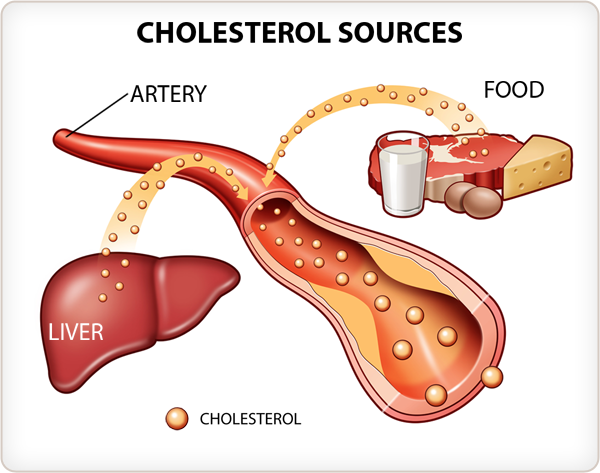We’ve all heard that high cholesterol is bad for you, but what exactly is cholesterol? And why is high cholesterol so bad? By the end of this article you’ll learn some things about cholesterol, the ‘good’ type, the ‘bad’ type and how to stop it affecting your health.
My Story
Two years ago, my Doctor told me that my cholesterol was getting high…or whatever she said…I didn’t pay much attention to her…I love food way too much to listen. I was way too busy to worry much about my diet or physical activity. Besides, I’m still wearing a size small, so weight is not an issue, right? I mean if I’m slim, cholesterol won’t be an issue, right? Fast forward to present day…I am back on my fitness kick, and I’m eating healthier (this part, I’m still working on), and I have a prescription for cholesterol medicine (I refuse to take it)…no worries I know exactly what to do…cardio…cardio…cardio…
So, what is cholesterol?
The text book version is that cholesterol is a fatty substance present in our cells that’s actually highly important for the body to function optimally. So, while high cholesterol should definitely be avoided, you don’t want to completely eliminate it from your body. It indirectly helps to create hormones such as cortisol, DHEA and testosterone which is why maintaining a healthy level of cholesterol is important for both men and women.
Cholesterol is produce by the liver. Though, some foods contain a certain amount of cholesterol which is why they’re recommended to be avoided for those who are at risk.
Good and Bad Cholesterol
There are two types of carries of cholesterol called LDL (low-density lipoproteins) and HDL (high density lipoproteins). The former is often referred to as ‘bad cholesterol’ with the latter being dubbed ‘good cholesterol’. LDL carries cholesterol to the cells that need it. However, if there’s too much cholesterol for the cells to handle, then it can build up around the artery walls leading to disease. This is why it’s so commonly referred to as ‘bad cholesterol’. On the other hand, HDL carries cholesterol away from the cells and back to the liver to be broken down or released as waste and thus, reducing your chance of disease. Hence, the term good cholesterol and bad cholesterol.
What’s so bad about high cholesterol?
- Increased risk of heart attack
- Increased risk of stroke and mini strokes (transient ischemic attack/TIA)
- Narrowing of the arteries (atherosclerosis)
- Peripheral arterial disease (PAD)
As more and more cholesterol builds up around the artery walls, your blood flow begins to be restricted which can damage the heart, brain, muscles and organs.
Read Also – 3 Smart Ways to Maximize Your Workout
What causes high cholesterol?
- A poor diet
- Smoking
- Diabetes and high blood pressure
- History of stroke or heart disease in the family
A healthy cholesterol level is 5mmol/L (millimoles per liter of blood) or less for healthy adults or 4mmol/L or less for those at high risk. LDL levels should maintain at 3mmol/L or less for healthy adults or 2mmol/L or less for those at high risk. Higher than 1mmol/L of HDL is considered healthy with anything lower increasing your risk of disease.
It’s important to note that cholesterol is just one marker of health and there are many other factors that must be taken into consideration in order for you to be considered ‘healthy’.
How can I manage my cholesterol levels?
Maintaining a healthy, balanced diet consisting of natural foods is key for having normal cholesterol levels. As well as this, engaging in regular exercise and staying away from smoking is also important.
You can improve cholesterol with medications also, but you can also change your lifestyle and eating habits. Here are some ways to do so:
- Diet change by eating more foods that is heart health, such as foods rich in omega-3 fatty acids, increasing soluble fiber, and adding whey protein to your diet.
- Exercise at least three days of the week and increasing other physical activity. Do something fun that you love to do. This could be swimming, taking a walk in the part, bike riding, or playing your favorite sport
- Quit smoking
- Decrease alcohol intake
- Lose weight as much as 5 or 10 pounds of weight loss can improve cholesterol levels
- Supplements are available to lower or remove cholesterol. There is Nutrim, which fights cholesterol in five ways, removing it from the body, inhibit the absorption of cholesterol, flush fat, replace fat, and block cholesterol. You can find Nutrim at Amazon raging in price from $60 for a 30-day supply to $80 for a 60-day supply. You can also find additional supplements on Amazon or at your local drug store.
If all of these do not help, then talk to a doctor to find a suitable solution.





Hi,
I can post my article here https://lmgforhealth.org/
Please send me your each post and Link insertion price
Waiting for your reply.
Thanks..